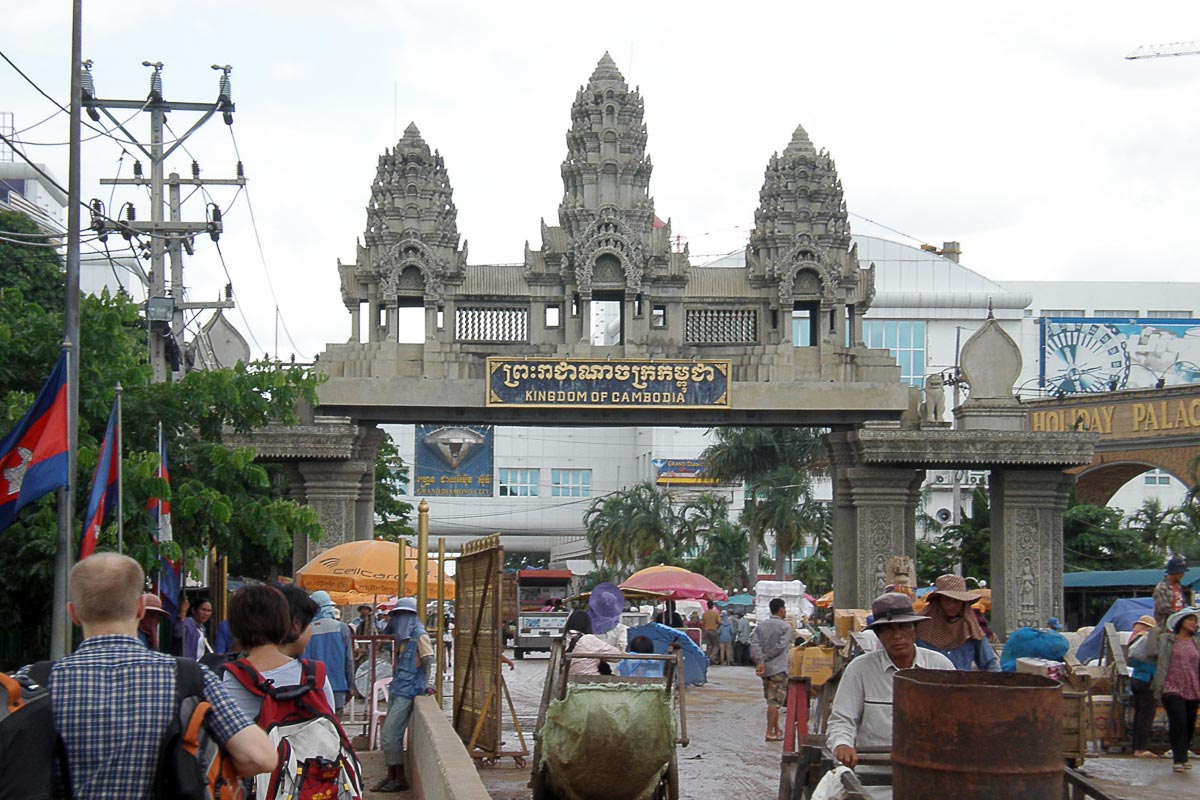
Call girls in the doorway
All giving me the eye
But my heart's just not in it
I might as well pass right on by
—Bob Dylan
Many people enter Cambodia from Thailand via the town of Poipet (ប៉ោយប៉ែត). It’s not too far from Bangkok and there is easy transportation there. Few, however, actually hang around in the town of Poipet itself. Small, dusty, and wild, Poipet, Cambodia can feel unnerving. It’s ramshackle, its streets turning the usual energy of a border crossing into something chaotic and wild.
Naturally, as we passed through Masayo and I decided to get a room in Poipet for the night in order to see it more. What’s the worst that could happen?
Bangkok to Aranyaprathet
From our hotel in Bangkok, where we stayed briefly after returning to the Thai capital from the amazing ruins of kkhothai, the first order of business was to find a train for the one-hour journey to the town on the edge of Thailand, called Aranyaprathet (อรัญประเทศ). The train left at an ungodly early hour. Bleary and blinking as Bangkok began its daily manic boil, we sat in our hard, backwards-facing seats in the third-class train waiting to depart. Someone walked by selling coffee in small cups for almost nothing.
Masayo was dozing but I bought one. The coffee was terrible. I looked out the window at the people in the station. The buzz of excitement was everywhere, even if nobody was quite awake yet. I sipped my coffee and loved its wretchedness. What better companion for a trip into the wild Southeast Asian unknown than crappy train coffee? It was perfect.
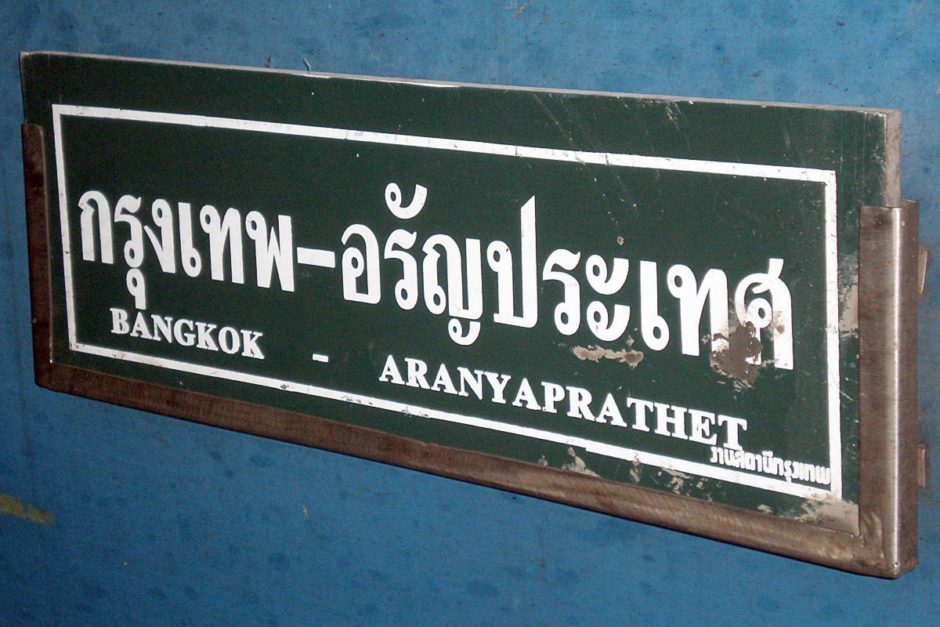
Eventually the train started to move and we started pushing through the outskirts of Bangkok. The city is, generally speaking, well-off and there are several nice districts with upscale shopping centers and nice, new apartment blocks. But this train wasn’t in those areas; outside our open window were piles of trash with birds careening over them. Decrepit buildings passed by looking empty, but they probably weren’t. I finished my coffee and didn’t want another.
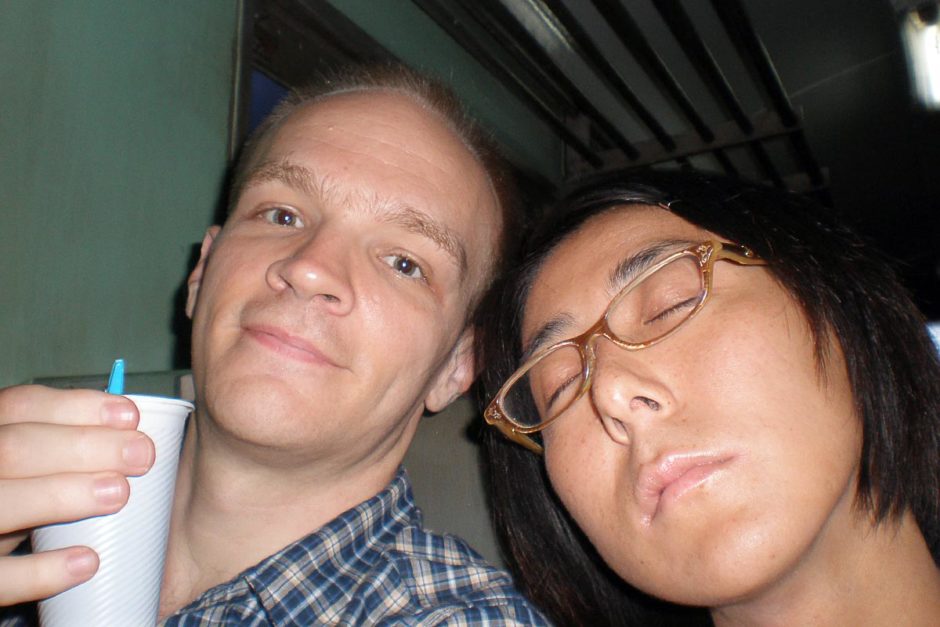
After an hour in the hot Thai countryside the train arrived at the terminus of Aranyaprathet. (It’s pronounced roughly as “ah ron ya PRAH tet”.) The train doesn’t continue into Cambodia, which is known for being much poorer than Thailand and for lacking in infrastructure.
In Aranyaprathet we found a small restaurant for our final Thai meal – noodles and chicken, natch. We also changed some money over to Cambodian riels. And then it was time: we hired a tuk-tuk to drive us the last few kilometers of Thailand to the border crossing itself.
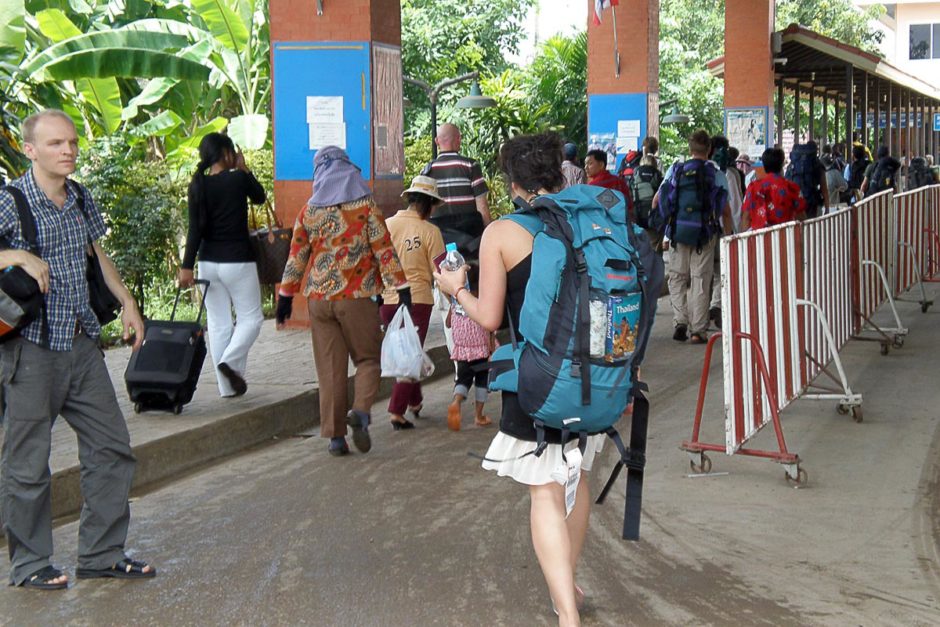
Scam paranoia
After getting stamped out of Thailand we strode through the no man’s land between the countries. Emerging from a narrow concrete walkway with a motley bunch of disconnected locals and other travelers, we saw a man with a clipboard waving us effusively over to a little covered area, inside which were about four guys sitting at a long cheap table.
Masayo and I approached and they asked us to sit down and hand them our passports. I didn’t know who they were and made a big deal of being hesitant to do so, but eventually relented. A guy looked over them both, then told us we each had to pay $10.
Alarm bells immediately went off in my head. These guys had uniforms but didn’t quite seem official. Even their name tags seemed unconvincing. They tried to explain why we had to pay but I didn’t get it. Finally, having decided that this was some bizarre scam here in no man’s land, I snatched the passports back and motioned for Masayo to stand up and follow me.
We left in a huff, but had avoided losing money to an inept bribe.
Further towards the Cambodian border, as we passed under a giant gate decorated with the spires of Angkor Wat and then past a large casino and hotel complex, we saw that most tourists were entering a small immigration building on the right. I stopped one Western tourist and asked him if he’d had to pay any money to enter Cambodia. He didn’t seem to quite trust me – who would in this defenses-raising atmosphere? – but did briefly answer.
“Yes, I had to pay $10 for a visa,” he told me in a German accent.
“Just back there?” I asked, motioning to the covered area.
“No, in advance,” he said and quickly moved away towards the building.
I looked wanly at Masayo, who was tired but being patient with me and my paranoia. “I guess we do need to pay,” I smiled sheepishly, and then recalled that I myself had paid this fee when making a border run from Surin, Thailand to O’Smach, Cambodia a few weeks ago. Whoops!
We returned to the covered area and its sighing (and apparently official) guards. We each paid $10, got new visas affixed to our passports, and I thanked them with a big smile as if there had been no problem.
Finally into Poipet
Once stamped into Cambodia, we emerged from the immigration building into the town of Poipet. People were hanging around a large unpaved roundabout, some selling water or offering rides. Some were just standing there, looking hot and vaguely perturbed. Other tourists were finding bus rides to the Cambodian interior. A large Khmer statue faced us in the middle of the roundabout, assuring us that all was well.
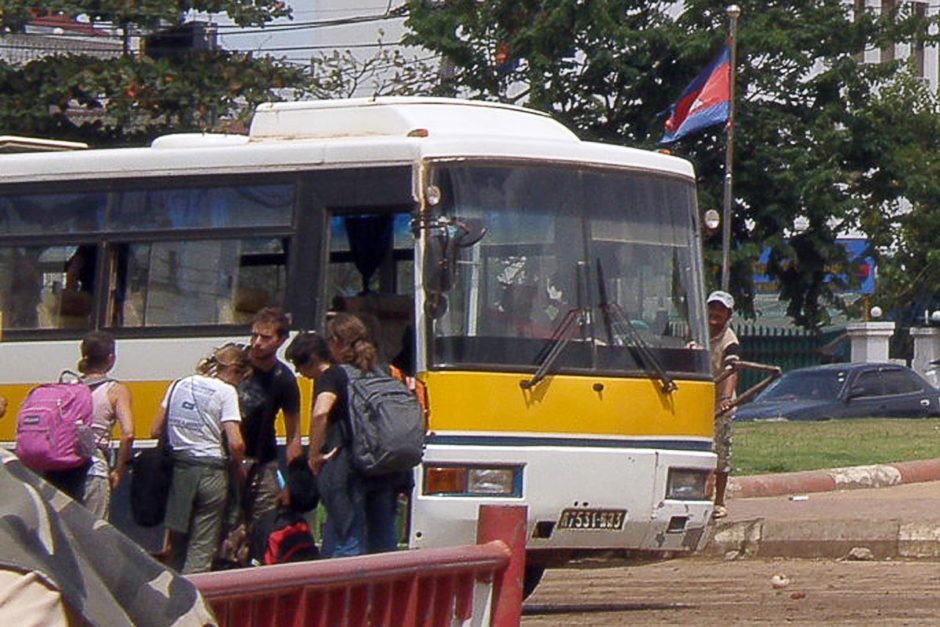
We pushed past all of this; I wanted to secure a room for the night. Getting this far from Bangkok was enough for a day, and I hated to just step into Poipet and then immediately leave. We might miss something cool.
The main road through town was unpaved and we walked along the edge of the mud, motorbikes and cars fighting with each other inches from us. It was hot and dusty and the air was full of fumes. We had no real destination in mind; I just assumed there would be cheap hotels. People kept offering us rides which I dismissed with increasing anger and frustration.
The first hotel we tried was not at all what we were looking for.
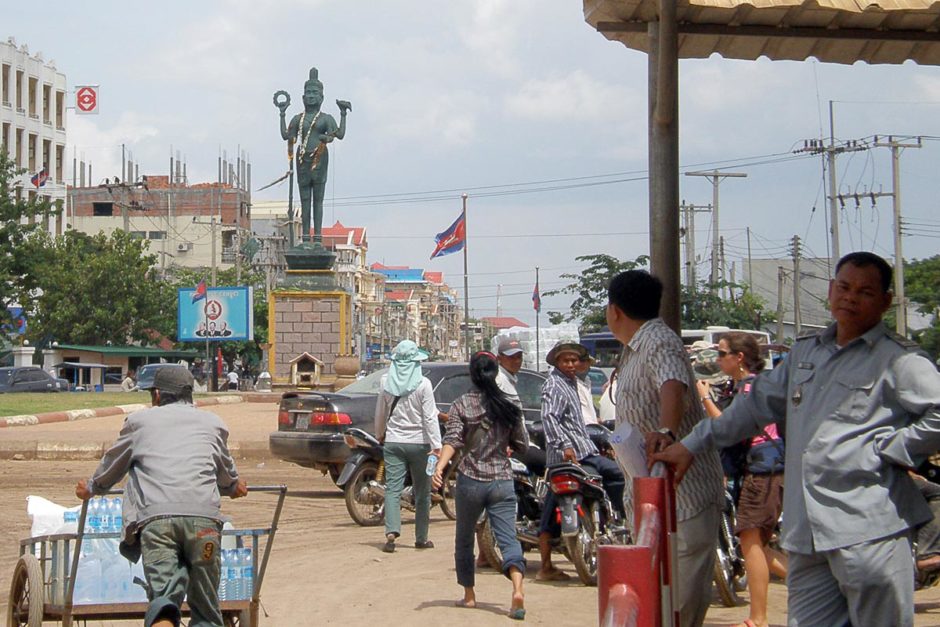
The “weird” hotel: no thanks
On the right I noticed a small hotel and we weaved through the traffic towards it. Some people were hanging around on the porch area outside, including a woman who seemed to be in charge. Eyes half-closed but with a functional geniality, she agreed to show me a room. It was upstairs so Masayo waited with the goony strangers on the porch.
The lady and I walked up the stairs and into a small corridor with faded wallpaper and an opening to the outside at one end allowing heat and dust, but also light, in. She opened one of the room doors and motioned for me to take a look.
There were no windows inside the room, and the lights we off: I couldn’t see a thing. But I stepped in, trying to adjust my eyes. I thought I could make out a desk and bed. I motioned for the woman to turn the lights on but she just smiled.
After a few seconds I began to wonder exactly what sort of hotel this was. Perhaps a rent-by-the-hour place for girls or for anonymous outlaws? Perhaps so, and anyway this was clearly not for us. I smiled thanks to the woman and we walked downstairs.
Masayo had been waiting very expectantly; she was tired and nearly overcome by the day’s exertions and Poipet’s dirty air. I angrily told her that we needed to keep walking which just confused her. Why? she wanted to know. But I was in no mood to explain. “No electricity,” I barked at her.
She followed me back out to the dirt road full of cars and jostling motorbikes, now not only tired and coughing but annoyed.
A good hotel, finally
A little further down the road we saw a much more promising place: Poipet Pass Hotel. Not a Hilton, exactly, but it seemed like a regular place. I went in and noticed a large customer counter and that wonder of wonders, electric lighting! I knew you could do it, Poipet.
I asked if they had a room and they did; I took a look and it was perfect: a bed, a shower, a window, and a desk. Everything seemed clean. And there were lights that worked – and it was super cheap. I paid for a night and Masayo stumbled in, dropped her heavy bag, and sank into a nap.
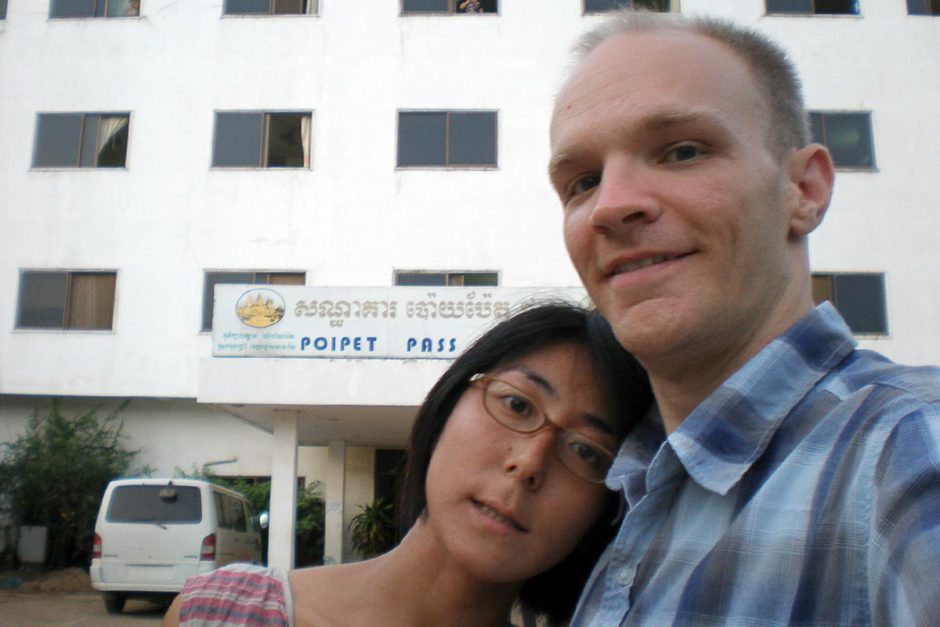
Poipet didn’t turn out to have much for us. We walked around later, as the hot afternoon wore on, and found an extremely simple noodle meal at an extremely small corner restaurant in the dirt. We sat at a tiny table on tiny chairs, the only tourists in the area. But it was filling enough and the service was friendly.
Further around Poipet
There’s a market section in Poipet full of little tin hut shops. For some reason, they were all identical: they sold cell phones. Each one, about six feet wide, had a little glass case with dozens of models on display and two or three people behind the counter, waiting for unlikely customers. We strode past dozens of these stalls. Why did they all exist here? Was there really a market for these phones or is it just easy to set up a franchise? There was an air of desperation rather than entrepreneurship about the doomed kiosks.
Near the bus station in the early evening, an older guy on a motorbike rode up beside us and offered to take us to a restaurant he knew of. We weren’t looking for food, and wouldn’t have been interested anyway, and I told him no thanks. He kept trying to convince me for a little bit, but getting nowhere finally exploded in anger. Berating me wildly, he rode off ahead and turned the corner, out of sight.
Well excuuuuuuse me!
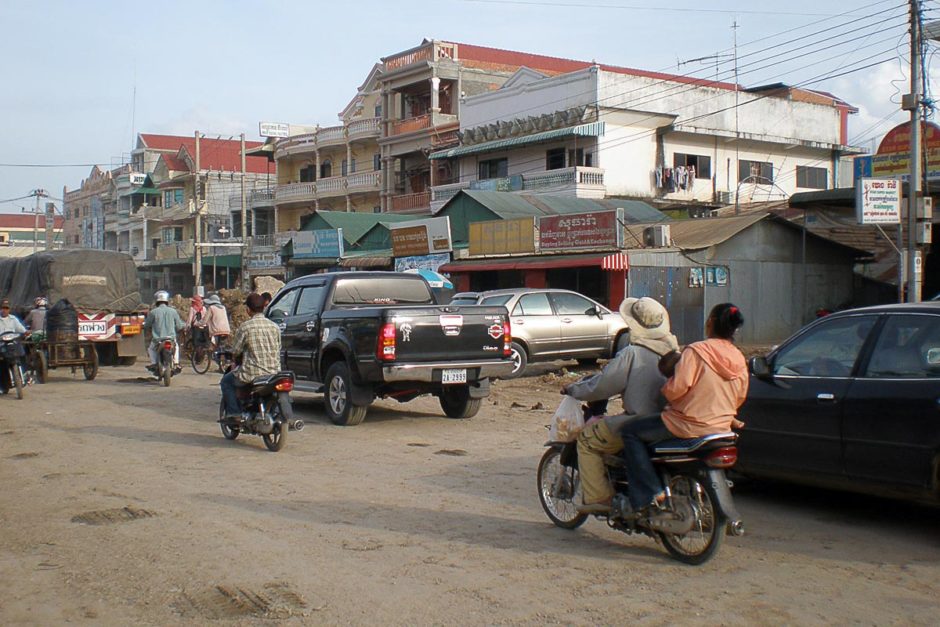
Poipet kind of sucks. There’s nothing to entice anyone to stay here that isn’t a drinker, gambler, sex tourist, or on the run from someone. I’m glad we stayed one night just to check it out, but it hasn’t left a great impression on us. I see why most tourists make their way to a larger town further inside Cambodia.
Tomorrow we will have to deal with Poipet a little bit more though – we need to find some kind of transportation somewhere out of this town and further into the country. I hope it proves a little smoother than today.
Thanks for reading. Suggested:
- Share:
- Read: Day 227: Unexplained dinosaurs and psychedelic statues by the river
- Join: Free email newsletter (info and early video access)
- Support: Patreon (much earlier video access and other perks)

Support independent travel content
You can support my work via Patreon. Get early links to new videos, shout-outs in my videos, and other perks for as little as $1/month.
Your support helps me make more videos and bring you travels from interesting and lesser-known places. Join us! See details, perks, and support tiers at patreon.com/t1dwanderer. Thanks!
Want more? Get the free newsletter
Join us! Sign up to my email newsletter to receive updates, behind-the-scenes info,
and early links to my new YouTube videos before everyone else

Very poor. Better stay at home and sleep mother’s lap